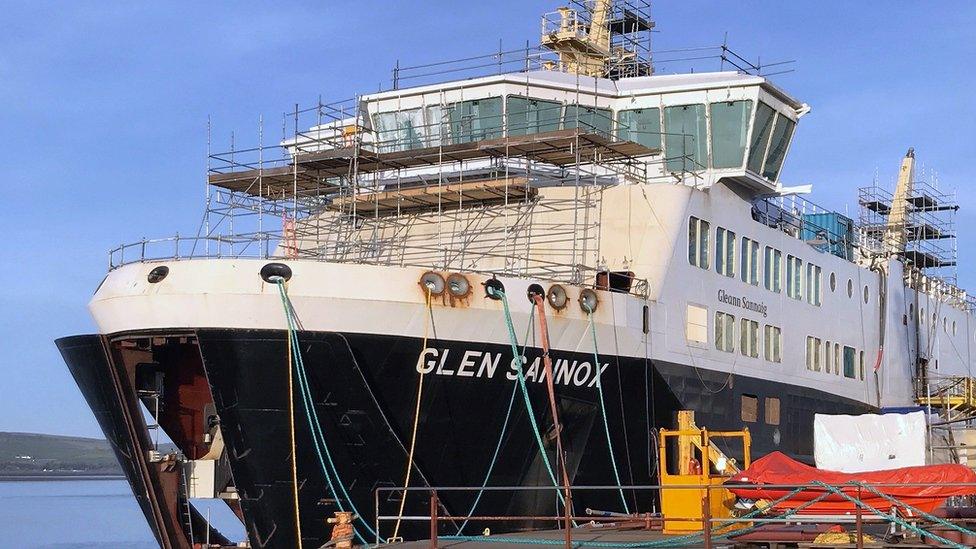'Catastrophic failures' to blame for ferries saga
- Published
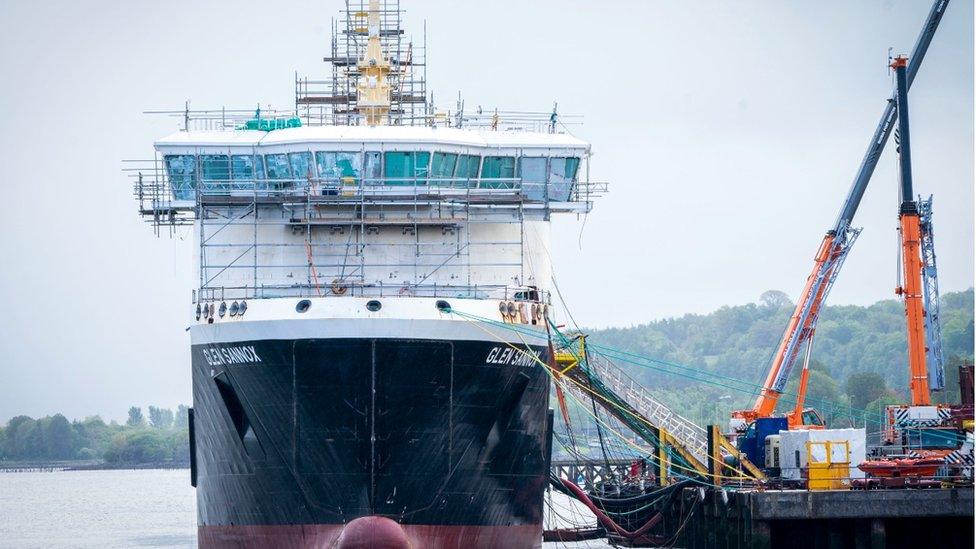
The Glen Sannox is one of two delayed and over-budget ships expected to come into service next year
The former owner of a shipyard building two CalMac ferries has been accused of a "catastrophic failure of management".
The vessels, earmarked for routes on Scotland's west coast, are four years behind schedule and hugely over budget.
CMAL, the government-owned company responsible for the procuring the ferries, told MSPs that Ferguson Marine's management was responsible for much of the cost of the over-runs.
And CMAL bosses denied their own "meddling" was to blame.
They were giving evidence to MSPs on Holyrood's public audit committee, following a highly critical report into the situation by Audit Scotland.
It comes after Jim McColl, the former owner of the Port Glasgow shipyard, gave evidence to the committee earlier this month blaming CMAL for most of the problems with the building of the two CalMac ships.
Ferguson Marine Engineering Limited (FMEL) was awarded the contract in 2015 but went bust in 2019 and the yard was nationalised by the Scottish government. The ferries should have been completed in 2018 but will not be finished until at least the end of next year.
At Holyrood, CMAL's chief executive officer Kevin Hobbs denied Mr McColl's claims that it had hindered the construction of the ships.
He said changes CMAL asked for were fewer and less costly than what is average in shipbuilding.
"We didn't meddle," he said. "We can't meddle. But when something goes catastrophically wrong it's easy to slope your shoulders and blame someone else."
Mr Hobbs said: "To be honest about it, Mr McColl has no shipbuilding pedigree whatsoever."
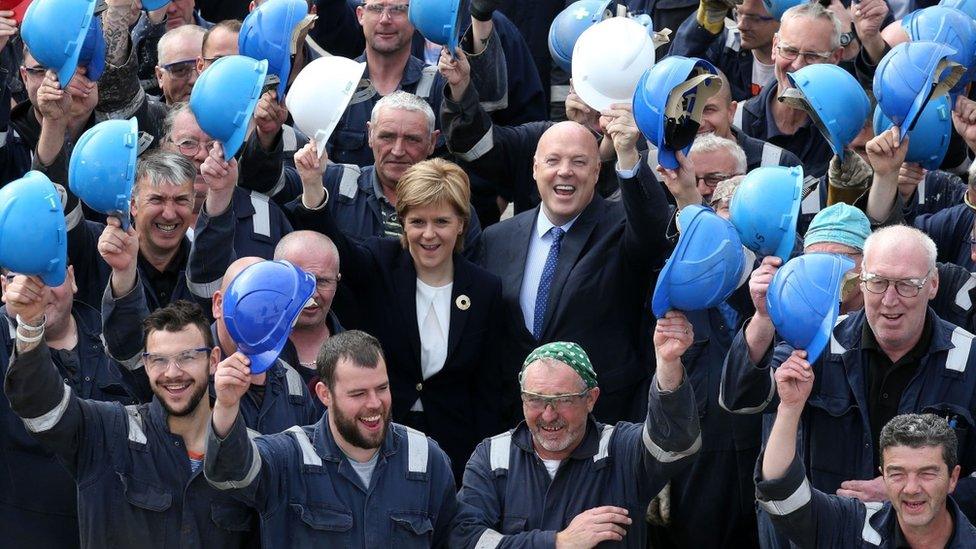
Nicola Sturgeon visited the Ferguson shipyard on the day it was announced as preferred bidder for the ferries contract
Ms Hobbs said additional costs mounted up because mistakes were made.
He said this was a "catastrophic failure" of the management, not the workforce.
"There were mistakes made by the builder because they did not have approved drawings," he said. "When the units were inspected they were riddled with errors that had to be undone and redone again."
"The money effectively was wasted, that's what happened," he said.
Mr Hobbs was also asked about the cables on the ferries, after it emerged that hundreds were too short to reach the control panels - adding £8.7m to the cost of the ships.
Earlier this month Mr McColl told the committee that the problem arose because the position of equipment was changed by the new management team.
Mr Hobbs said the original firm that installed the cables did not return to work at the shipyard after it was nationalised.
A new contractor is now working with the yard and "in a few instances" specified the control panel should go in different compartments, meaning the cables are too short, he said.
"Mr McColl says we [CMAL] moved the equipment," Mr Hobb said. "We did not. It was up to the shipyard to decide how that was going to be built."
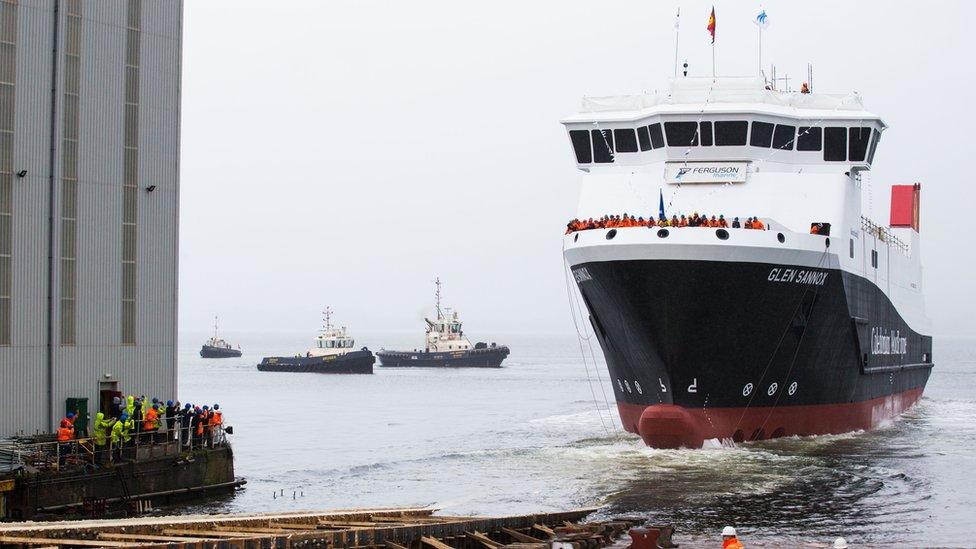
The Glen Sannox was launched in November 2017
The shipyard's former management also came in for criticism for their decision to launch one of the ships - the Glen Sannox - in November 2017.
The launch was attended by First Minister Nicola Sturgeon but CMAL bosses had told Mr McColl it was "too premature".
Mr Hobbs said: "Our opinion, and normal shipbuilding practice, is you do as much as you can under cover in the first instance.
"You join-up outside, and you do as much as you can when the ship is dry and it's only then that you launch a ship."
CMAL's Interim chairwoman Morag McNeill suggested Ferguson's pushed for the premature launch because it would release more funds.
Mr McColl told the earlier committee meeting that the launch had to take place to free up the slipway to work on the second ship.
'Letter of comfort'
Earlier CMAL bosses told MSPs they had serious reservations about awarding the contract to Ferguson Marine without the normal financial safeguards - a full builder's guarantee.
This was highlighted in the Audit Scotland report earlier this year. It criticised the absence of the guarantee which would have provided full repayment if the £97m project got into trouble.
Mr McColl has insisted he offered a suitable alternative - a £25m deposit and an agreement that CMAL would have ownership of the ships and raw materials while the vessels were under construction.
CMAL's Interim chairwoman Ms McNeill said it wanted to restart the tender process when the issue came to light.
The contract was only agreed after they received a "letter of comfort" from a senior Transport Scotland civil servant.
She described it as an "instruction to proceed by ministers" but it also gave an "unconditional financial undertaking to protect the solvency of CMAL if there was a problem with the contract".
Ms McNeill said she chose not to attend a public announcement that Ferguson Marine had been named preferred bidder on 31 August 2015, during which Nicola Sturgeon visited the shipyard.
She said negotiations over the contract and the builder's guarantee were still taking place and it felt like a "fait accompli".
Eric Ostergaard, the former chairman of CMAL, said: "It was obvious there was an interest from the Scottish government to see that contract was awarded to FMEL and I presume from consideration of economic development and job creation within the yard and in the area of the yard."
- Published24 June 2022

- Published26 April 2022

- Published16 June 2022
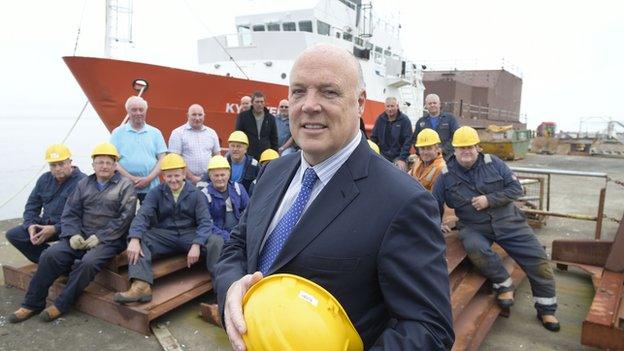
- Published23 March 2022
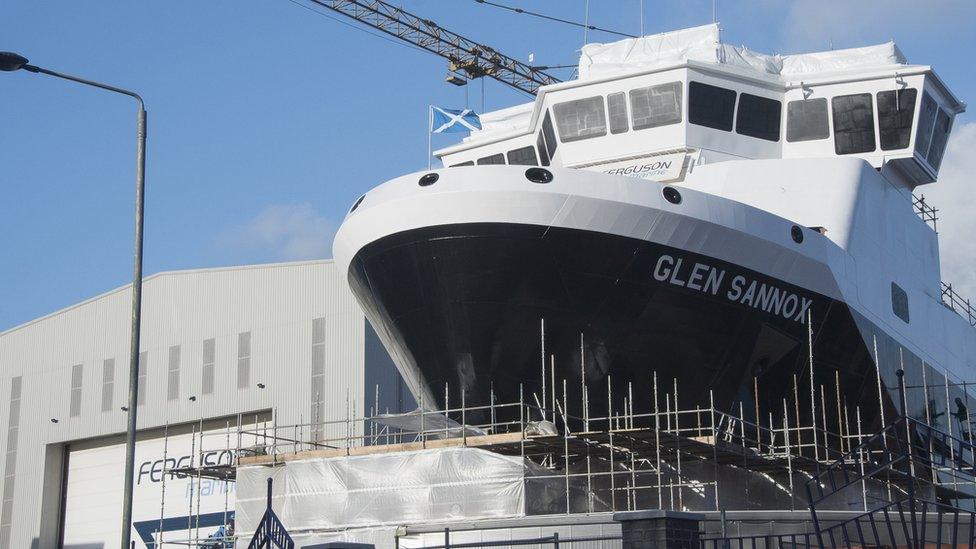
- Published23 March 2022
